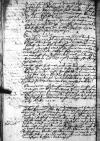Letter #4932
Ioannes DANTISCUS to [Johann von WERDEN?]Löbau (Lubawa), 1534-07-11
Manuscript sources:
Auxiliary sources:
| ||||||
Text & apparatus & commentaryPlain textText & commentaryText & apparatus
Unsernn fruntlichnn grues und vil liebs unnd guts zuvorann. / Edler, ehrnfesterr her, gunstiger freundt. /
Wir sein bericht, das unser wein aus
Datum aus unsermm slosse
